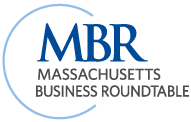Talent remains the core of the future of work
Below is an op-ed as it appeared on June 1, 2021 in the Boston Business Journal.
There are lots of questions circulating on the future of work, post-pandemic. While we may not know exactly how the future will unfold, our reality is starting to come into focus. A key takeaway from a recent survey of Massachusetts Business Roundtable members, including CEOs and senior executives from large employers across the commonwealth, cites 79% of responding employers will use a “hybrid” work model—a combination of remote and in-person work. This is a dramatic shift from pre-pandemic days, when 90% of these same employers maintained a traditional work model that was all or mostly in-person in an office. The concept of how employees work has flip-flopped during the pandemic — for those who are able to do so—and it seems clear that the traditional way of operating will remain in the past.
Based on feedback from our members, we see a trend in a few key areas:
- Office Design: As companies consider new designs and layouts to encourage in-person collaboration, 50% of responding employers plan to eliminate personal workstations and 65% of respondents will decrease office density. While 38% of respondents forecast decreasing their Massachusetts footprint, this is driven by a change in how people will work, not because of a decrease in headcount.
- Digitization: Unsurprisingly, 90% of respondents anticipate increasing digitization of employee interactions and nearly 70% foresee an increase in digitization of customer channels over the next 12 to 24 months. This major shift has already exploded since the start of the pandemic with the dramatic rise in telehealth, remote learning and online banking as examples. What has transpired over the past year has dramatically accelerated the rate of digital transformation within the business community.
- Diversity, Equity & Inclusion (DEI): 92% of respondents indicate plans to champion measures that will advance DEI in their organizations over the next 12 to 24 months. Nearly all responding employers also foresee visible commitments being made by executive leadership. These new or enhanced efforts are also supported financially among employers with 85% of responding companies intending to increase funding of DEI initiatives compared to pre-pandemic funding levels.
Despite these clear findings, many questions remain unanswered. About one-third of survey respondents anticipate employees will return to the office this calendar year, but two-thirds are unsure of the timing or are waiting for assurances that it is safe to do so. Once companies return to the office, with the vast majority shifting to a hybrid work model, the definition of “hybrid” is still very fluid and may likely vary by company and company culture, and ultimately be driven by employee preferences.
Additionally, 88% of responding employers plan to maintain, expand or relocate within Massachusetts, citing access to talent as a main driver for operating in the state. At the same time, among the 8% of respondents who are considering a reduction in their Massachusetts footprint, employers cite the cost of living and doing business. Moreover, when given the flexibility to consider remote options, the workforce from Massachusetts-based operations quadrupled from 5% working out of state pre-pandemic to 21% during the pandemic; among these responding employers, they forecast 15% of their local workforce will continue to work out of state.
So, what does this mean for public policy and the state’s competitiveness? Clearly, access to world-class, diverse talent continues to be our calling card. Massachusetts is an innovative ecosystem, with internationally recognized higher-education institutions, and an epicenter of global talent. Yet the pandemic has proven that remote work can be successful regardless of location, and that talent now has the flexibility to be increasingly mobile. At the same time, the pandemic has cast a spotlight on the thousands of unemployed and underemployed across Massachusetts, opening opportunities to train these jobseekers in skills and credentials for in-demand but hard-to-fill middle-skill roles.
Considered together, we need to ensure that Massachusetts maintains its competitive advantage by prioritizing the development, recruitment, inclusion and retention of talent balanced with a cost environment that avoids the risks of losing it. As one Roundtable member declared, “Business will go to where talent is.” In turn, we need to promote public policies that will create a more inclusive, equitable commonwealth for all to live, work and thrive.
JD Chesloff is president and CEO of the Massachusetts Business Roundtable, a Boston-based public-policy organization.
RECENT POSTS
- No Borders: Climate Change, A Call to Action for All
- Celebrating Diversity
- A Talent Agenda to Drive Massachusetts Competitiveness
- Taking Aim at the State’s Competitiveness
- Bentley and Roundtable Gather Executives To Discuss How Business Impacts Society
- Quarterly Policy Roundup: Q2 2024
- What We Learned on Our Trip to D.C.
- Conversations with Business Leaders: Navigating the Challenges Impacting Growth in Massachusetts
- Quarterly Policy Roundup: Q1 2024
- Black History Month: Reflections from Roundtable Staff
